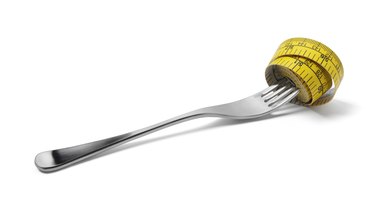
Weight Watchers does not consider itself to be a diet. According to its website, Weight Watchers is a plan or approach designed to help you live a healthier life while continuing to eat whatever you like. It may sound too good to be true to you, but it can work. The problem with Weight Watchers is that maintaining proper nutrition is a distant second to shedding pounds. Thinner does not necessarily mean healthier.
Vitamin Deficiency
Video of the Day
Weight Watchers is based on a points system. This system assigns a certain point value to different types of food. The number of points assigned to each food item depends on the amount of fat, protein, carbohydrates and fiber it contains. Vitamin and mineral content are not considered. Although Weight Watchers contends that you can get all the vitamins and minerals you need from eating enough fruits and vegetables, that would require most people to triple the amount of fruit and vegetables eaten every day. According to Harvard School of Public Health, the average American has three servings of fruits and vegetables per day but requires nine servings to maintain weight based on a 2000 calorie-per-day intake. In addition, the point system does not require you to eat any fruits or vegetables every day, which could lead to vitamin deficiency.
Video of the Day
Undernourishment
Weight Watchers focuses on counting points, not calories. However, counting calories is also important. If you consume calories significantly below the average intake of 2000 calories per day, you are at risk for undernourishment. For example, Weight Watchers frozen meals contain an average of 250 to 300 calories each. So if you ate one for breakfast, lunch and dinner, your total caloric intake for the day would be under 1000, which is less than half of the average recommended intake. Undernourishment slows down your metabolism, making it harder to lose weight. It may also make you feel too tired or too weak to engage in exercise, an essential component of weight loss.
Sodium
According to the FitDay website, the average daily recommended maximum amount of sodium is 2300 mg. Let's say you are on Weight Watchers and have the following Smart Ones frozen foods in one day: breakfast quesadilla has 730 mg of sodium, pepperoni pizza for lunch has 840 mg, a Salisbury steak entree for dinner has 820 mg and strawberry shortcake for dessert has 280 mg. Your total sodium intake for the day would be 2660 mg. Therefore, you would have exceeded the daily recommended amount without yet factoring in drinks or any other snacks you may have during the day. A high-sodium diet is especially risky if you have high blood pressure.
- Smart Ones: Products
- WeightWatchers: Nutritional Gaps from Cutting Out Carbs Compromises Health
- Vitamin and Health Supplements Guide: Vitamin Supplements Overview
- Harvard School of Public Health: Vegetables and Fruits: Get Plenty Every Day
- FitDay: Are Frozen Diet Foods Really Healthy?
- Fitbit: Nutritional Information, Diet Info and Calories in Weight Watchers Smart Ones
- The Merck Manuals: Undernutrition